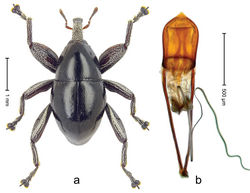Trigonopterus australinasutus
| Notice: | This page is derived from the original publication listed below, whose author(s) should always be credited. Further contributors may edit and improve the content of this page and, consequently, need to be credited as well (see page history). Any assessment of factual correctness requires a careful review of the original article as well as of subsequent contributions.
If you are uncertain whether your planned contribution is correct or not, we suggest that you use the associated discussion page instead of editing the page directly. This page should be cited as follows (rationale):
Citation formats to copy and paste
BibTeX: @article{Riedel2016ZooKeys, RIS/ Endnote: TY - JOUR Wikipedia/ Citizendium: <ref name="Riedel2016ZooKeys">{{Citation See also the citation download page at the journal. |
Ordo: Coleoptera
Familia: Curculionidae
Genus: Trigonopterus
Name
Trigonopterus australinasutus Riedel sp. n. – Wikispecies link – ZooBank link – Pensoft Profile
Diagnostic description
Holotype (Fig. 5a). Length 3.28 mm. Color black; legs deep ferruginous to black; antenna lighter ferruginous. Body subovate; in dorsal aspect and in profile with weak constriction between pronotum and elytron. Rostrum in basal half dorsally markedly swollen, punctate-reticulate, densely squamose with white erect scales; subapical third subglabrous, weakly punctate, sparsely setose. Eyes medially approximate. Pronotum subglabrous, with minute punctures; laterally punctures somewhat larger; evenly rounded towards sides; in front of procoxa with acute process. Elytra subglabrous with minute punctures; striae indistinct; basal margin straight, towards sides bordered by row of moderately deep punctures. Femora with anteroventral ridge distinct, rounded basally; at middle with small tooth. Mesofemur and metafemur dorsally densely squamose with white scales; metafemur with distinct dorsoposterior edge. Abdominal ventrites 1-2 medially concave. Abdominal venter medially subglabrous, laterally with sparse white scales. Penis (Fig. 5b) apically subangulate, weakly pointed; transfer apparatus beak-shaped, pointed, directed basad; ductus ejaculatorius without bulbus. Intraspecific variation. Length 2.98–3.47 mm. Female rostrum in apical 2/3 dorsally flattened, subglabrous, sparsely punctate; basally swollen, with erect white scales.
Material examined
Holotype (ANIC): ARC4238 (PCR failed), Queensland, 11 km ENE of Mt. Tozer, S12°43', E143°18', 11-16-VII-1986. Paratypes (ANIC, QMBA, SMNK): Queensland: 2 exx, same data as holotype; 5 exx, ARC4239 (PCR failed), 3 km ENE Mt. Tozer, S12°44', E143°14', 28-VI-04-VII-1986; 1 ex, 8 km E by N of Mt. Tozer, S12°44', E143°17', beating rainforest vegetation, 07-VII-1986; 3 exx, 9 km ENE of Mt. Tozer, S12°43', E143°17', 05-10-VII-1986; 1 ex, Claudie R., nr. Iron Rg., under bark, rotten logs, 19-25-VII-1978; Gordon Creek area, Claudie Riv. District, 23-I-1982.
Distribution
Queensland: Iron Range.
Biology
Swept and beaten from rainforest vegetation.
Etymology
This epithet is a combination of the Latin adjective australis (southern) and the specific epithet of Trigonopterus nasutus (Pascoe), also an adjective.
Notes
This species is closely related to Trigonopterus nasutus (Pascoe) and Trigonopterus gibbirostris (Faust) from New Guinea. From the former it can be distinguished by a longer and spiniform transfer apparatus, from the latter by its medially pointed apex of the penis.
Original Description
- Riedel, A; Tänzler, R; 2016: Revision of the Australian species of the weevil genus Trigonopterus Fauvel ZooKeys, (556): 97-162. doi
Images
|
